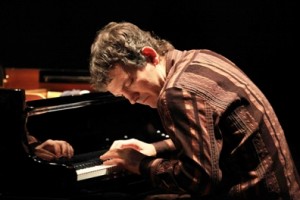TANGLEWOOD
Ozawa Hall
Brad Mehldau
Thursday, August 25, 2011
Review by Seth Rogovoy
(LENOX, Mass.) – Roll over, Cole Porter, tell Richard Rodgers the news. The last page has finally been turned on the so-called Great American Songbook. And good riddance to it once and for all.
I base this observation on Brad Mehldau’s solo piano concert at Ozawa Hall tonight, in which the musician and composer, although he did dip into what are annoyingly called standards, including Rodgers’s “My Favorite Things” (probably more a nod to John Coltrane than to that damn restricted songbook), drew largely from a different songbook, drawing heavily from the rock era, including numbers by Paul McCartney of the Beatles, Brian Wilson of the Beach Boys, Mick Jagger and Keith Richards of the Rolling Stones (as interpreted by The Verve), Roger Waters of Pink Floyd, and Kurt Cobain of Nirvana.
You could say that the Great American Songbook has finally expanded, or produced a second volume, what with Mehldau and his jazz peers in their thirties and forties drawing on music of the last four or five decades in the same way that jazz musicians used to draw upon music largely from the first half of the 20th century for the raw material for their improvisations. (It should also be noted that, in large part, this new repertoire is really Anglo-American, and in Mehldau’s case last night, heavily emphasizing the English part of that equation).
But rather than establish a new canon, how about let’s just accept that the barricades between high and low have been torn down once and for all and, in the hands of a brilliant improviser, interpreter, composer, musician, visionary and musical architect like Brad Mehldau, to coin a phrase, anything goes (apologies to Cole Porter).
And in his case, boy did it ever. And this was no rock show, either – no case of merely dabbling in simple rock melodies and making them jazzy for the piano.
Mehldau has forged a style and approach that, while drawing variously from Brahms, Gershwin, stride, Olivier Messiaen, Keith Jarrett, and the contemporary minimalists, is entirely his own. He finds the grunge in Richard Rodgers and the Schubert in Kurt Cobain.
Mehldau’s technique, such as on Pink Floyd’s “Hey You,” is to turn the basic harmonic riff into an ostinato played with the left hand, upon which he builds his composition – recognizable as the original yet at the same time a new rendition with improvisation, interpretation, and commentary, much of it in the right hand, exploring, as he did in this case, deep recesses inherent in the song’s modulations. His strategy is often modal; and he consciously picks compositions that are suited to this modal strategy, buttoning down a pedal point in his left hand while at the same time – and I have no idea how he does this – articulating the changes with that same hand, while providing melody and flight of fancy in his right. He really plays three parts for three-handed piano, yet accomplishes it with only two hands.
Nirvana’s “Smells Like Teen Spirit” was a dark, desperate, ugly rock dirge in the original. Mehldau turned it into an ethereal tone poem. He found the minimalism inherent in the hook and turned it into ringing chimes, and found lush patterns and even swing in what in the original was, well, grungy.
His rendition of the Beatles’ “Blackbird” utilized the same three-part strategy, while “God Only Knows” by the Beach Boys took full advantage of the potential of the grand Steinway, as Mehldau poured forth rumbling waves of chords at the bottom, cascading through the changes with only occasional commentary in the right hand, as befits a song invoking the Almighty and reflecting its anguish – “God only knows what I’d be without you” – the low rumbling at the bottom end answering the implied question, Mehldau at his most expressive and exalted.
For an encore, Mehldau pulled “Bitter Sweet Symphony” by the late 1990s English alternative rock band The Verve out of his bag of tricks, a song that is already a musical adaptation of a previous number, “The Last Time,” by the Rolling Stones. There are so many resonances and puns and hidden meanings alone in the song’s title, in the song’s original title, in Mehldau’s choice of this number as the final song to play, and the final song for him to play at Tanglewood, that it makes one’s head spin.
Mehldau has a lovely approach toward his instrument, crouching into the keyboard so deeply it seems like he is going to rest his head on the soundboard, and then slowly leaning back all the way, extending his arms to their very limits while still reaching the piano keys. It’s as if he’s playing piano and doing yoga at the same time, which suits his meditative, playful sound.
Mehldau spoke briefly and fondly of attending a summer music camp in the Berkshires when he was younger, and reminisced about coming to Tanglewood to hear the likes of Leonard Bernstein, Seiji Ozawa, and “young bucks” Yo-Yo Ma and Emanuel Ax.
I was warned not to dis him over his outfit of plaid shirt and contrasting striped trousers, so I won’t. Instead I’ll wonder if the plaid somehow was a nod to his fondness for Seattle grunge music, for which flannel plaid was the uniform, and the stripes …. well, I’m not quite sure what to make of the stripes.
So perhaps it’s time to close the book once and for all, and just listen to the music. And if it’s going to be played by Brad Mehldau, we’ll all be the richer for it.
Seth Rogovoy is an award-winning music critic and the author of Bob Dylan: Prophet Mystic Poet and The Essential Klezmer: A Music Lover’s Guide to Jewish Roots and Soul Music.

